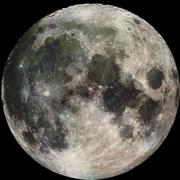 Building plans: could a base appear on the Moon within decades?© NASA
Building plans: could a base appear on the Moon within decades?© NASAJapan's space agency has provoked surprise among other space experts by re-affirming its ambition to build a habitable base on the Moon within decades. At a lunar exploration symposium in Tokyo this week, head of the country's lunar and planetary exploration programme Junichiro Kawaguchi announced a deadline of 2020 for sending astronauts to the Moon, and 2030 for constructing the base.
The plan isn't yet official: the Japan Aerospace Exploration Agency (JAXA) has not been allocated a budget for the project, which would be expected to cost up to 3 trillion yen (US$26 billion). But a vocal group of Japanese space scientists has called for the plan to become reality.
The dates and details presented by Kawaguchi build upon the country's 20-year vision for space exploration, released in the spring of 2005, which began to consider far-flung ideas such as a Moon base.
The agency intends to kick-start the project next year by launching a satellite into lunar orbit. This would be followed over the next decade by three unmanned spacecraft to collect samples and conduct research. Once a base has been built, JAXA envisions a few astronauts manning the facility for 6 months in turn.
It has been almost four decades since man first walked on the Moon. "The Apollo programme is old, so the technology to visit the Moon is there," says Bruno Gardini, manager of the European Space Agency's (ESA) Aurora project in Noordwijk, Netherlands. "But in terms of the financial capacity to build a base, we are talking billions of dollars."
Boldly go
Gardini says he is surprised by the boldness of the Japanese plan. The Aurora project is investigating robotic technologies that could potentially be used on missions to Mars, but the ESA has no plan to pursue a manned Moon station, Gardini says.
"To go to the Moon would cost so much that I don't think anyone could afford to, except possibly America," he says. "The financial effort associated with it is so high that it would have to be a joint global effort."
Satoki Kurokawa, a JAXA spokesperson, told news@nature.com that it isn't yet decided whether Japan would try to go it alone to fulfil these ambitions, or enlist international involvement.
ADVERTISEMENT
A unilateral move by any country to colonize the Moon doesn't make sense, comments Louis Friedman of the Planetary Society in Pasadena, California. "I don't think you'll see separate countries each with bases on the Moon — there's not that much to do there," he says. "It's not like Antarctica," he notes, where countries do have the funding and political will to maintain independent bases.
NASA has made it clear that it wants to develop its own capacity to go to the Moon and back. "It wants to be dependent on no one," Gardini says.
"Japan's level of commitment can't be compared to that of the United States," a senior executive from JAXA, who wished to remain anonymous, told news@nature.com.
Visit our aimstobuildmoon_base.html">newsblog to read and post comments about this story.
